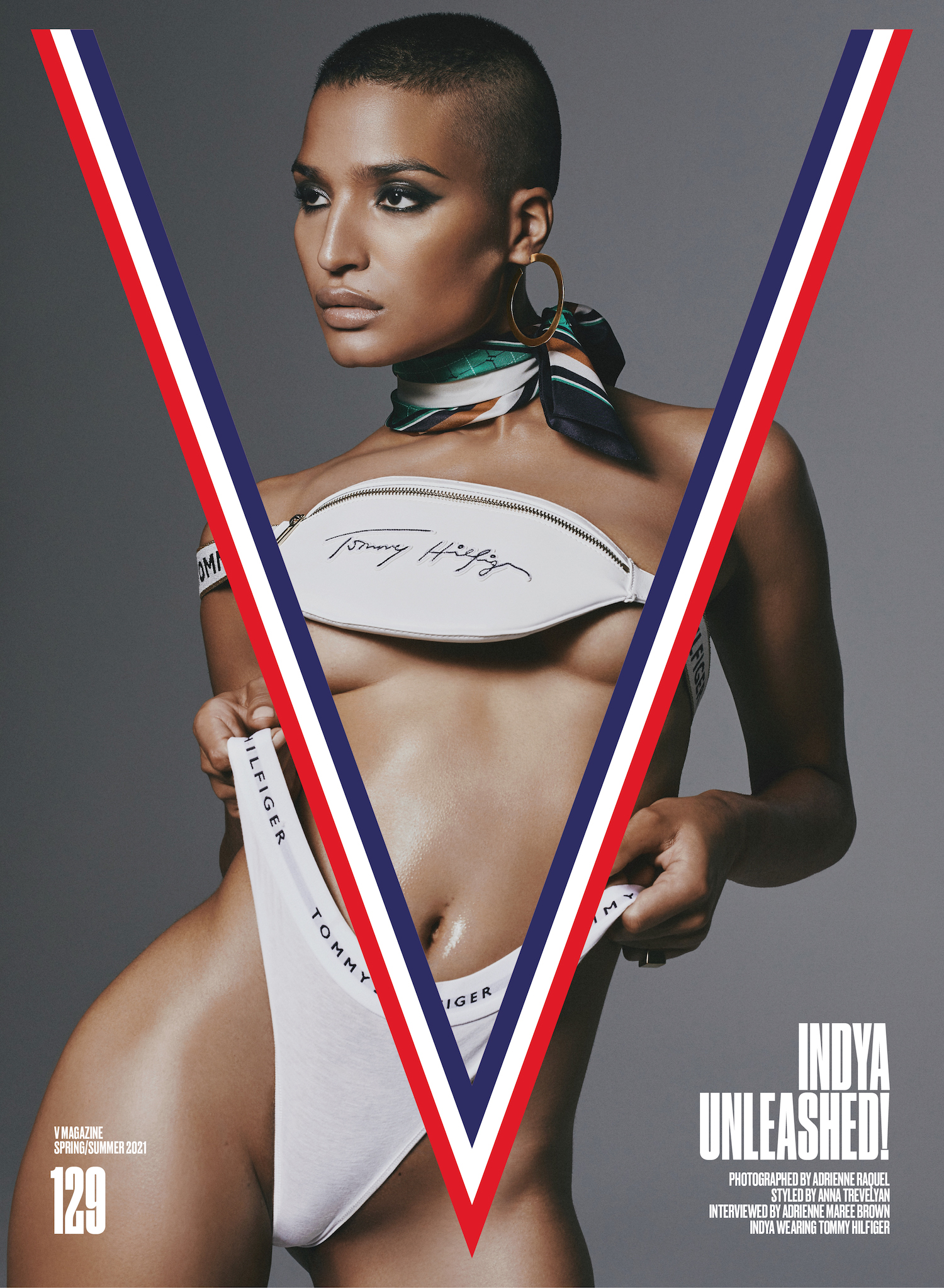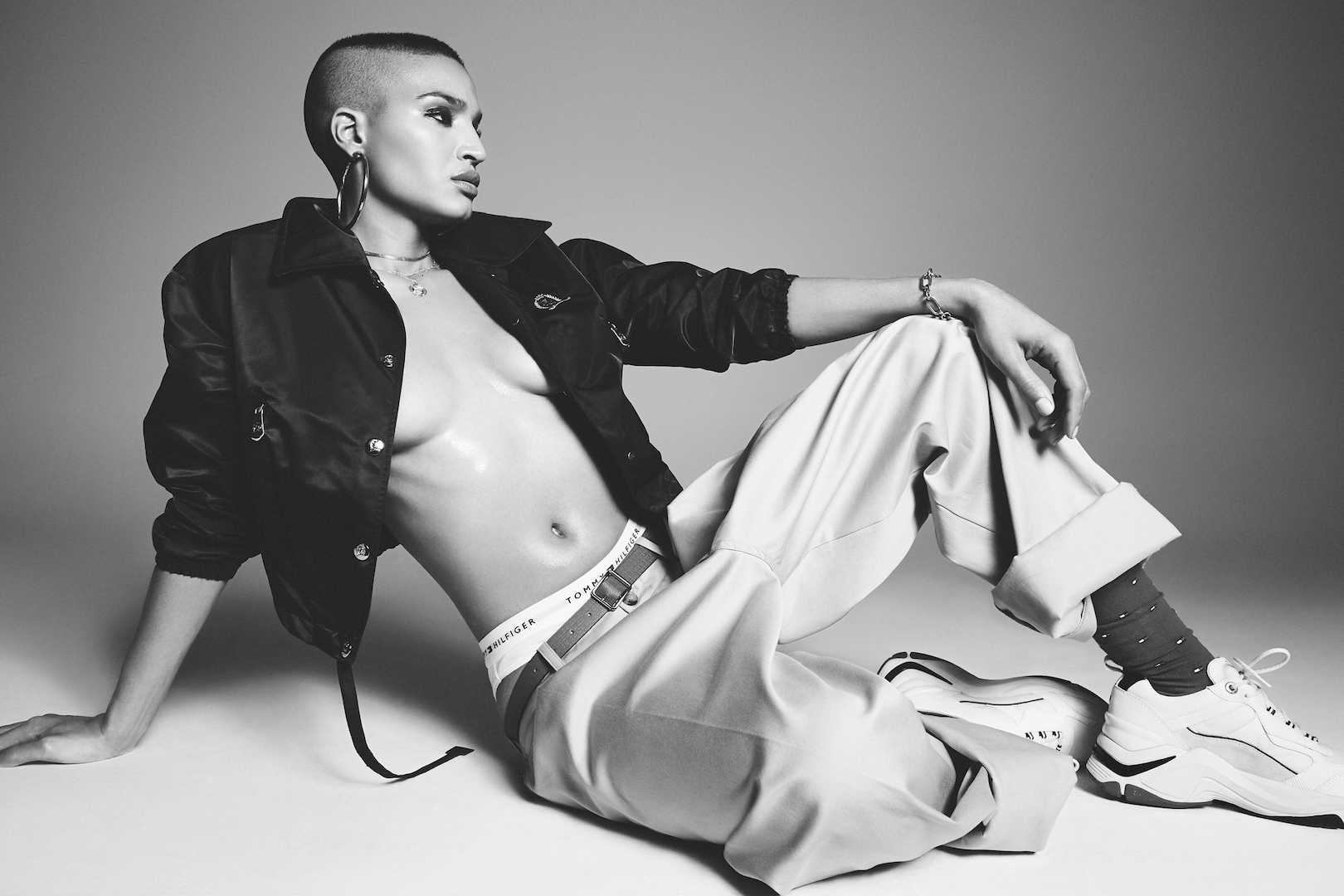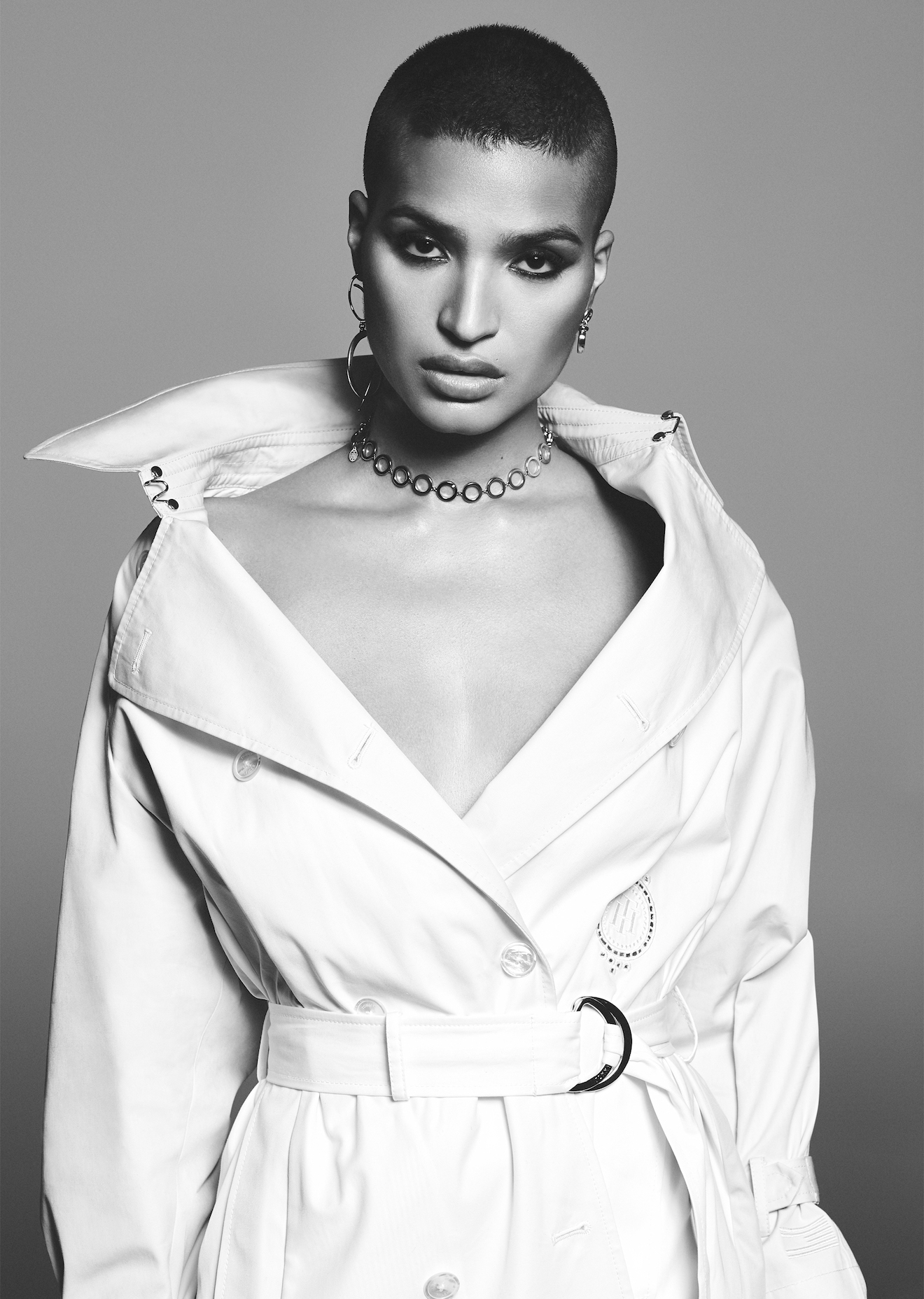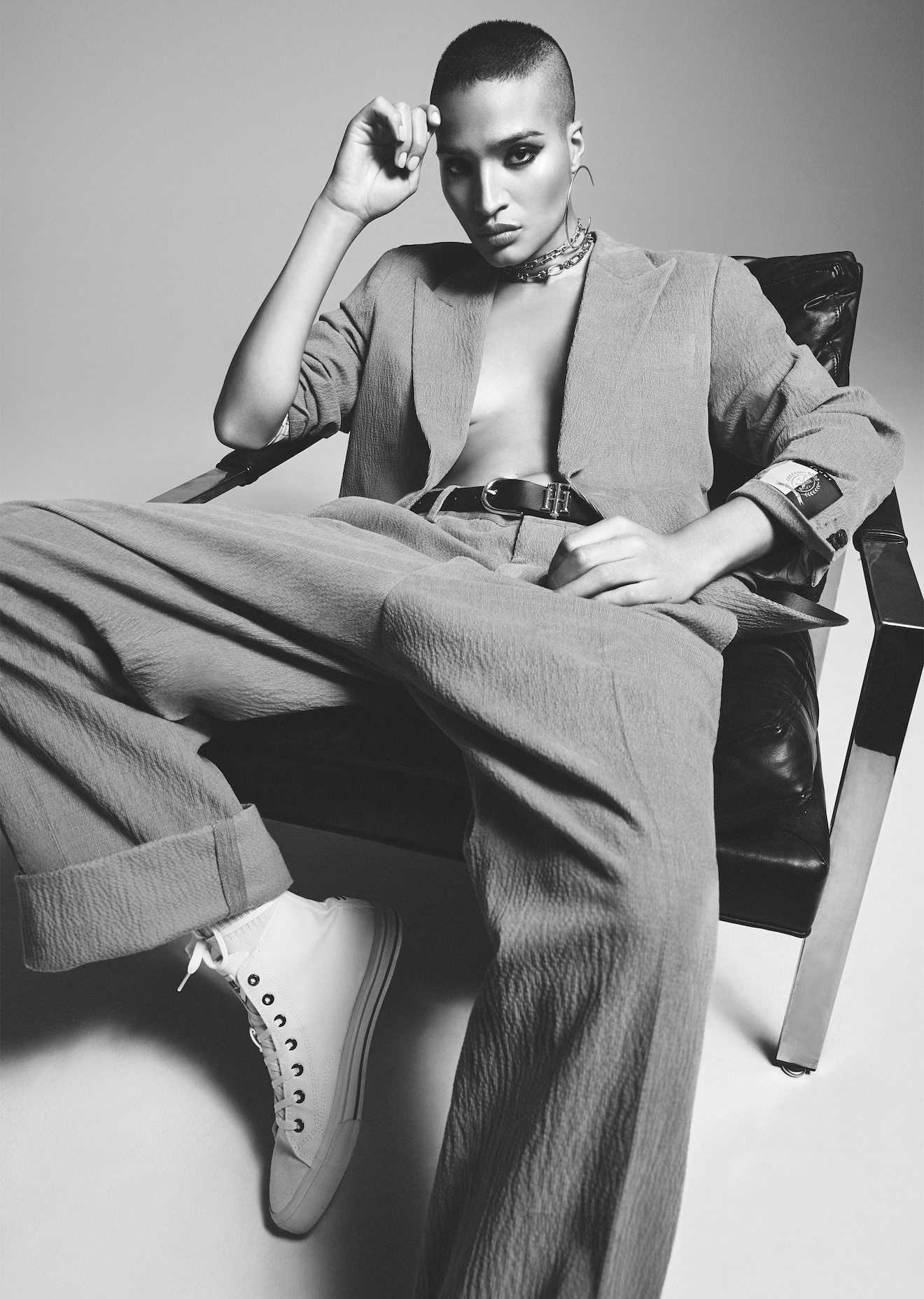This cover story appears in V129, order the special edition issue now!
On an increasingly bright pathway to global stardom, actress, model, and activist Indya Moore teams up with Tommy Hilfiger for the latest installment of the brand’s Moving Forward Together campaign—an initiative designed to help create a more diverse and inclusive fashion future. Joining renowned author Adrienne Maree Brown for a powerful conversation about identity, Moore’s unapologetic sense of self proves they’re not just a pretty face fronting a campaign, but in fact the perfect embodiment of its trailblazing nature. In true form, the Pose actress gets personal detailing the importance of trans visibility, their life’s mission, and the key to authenticity.
Read the exclusive interview below.

Adrienne Maree Brown: So, Indya…first of all, how are you today, twenty-six years into your life and eleven months into the pandemic?
Indya Moore: Damn. I’m so many things. I mean…I made it, you know? I am really happy to have made it. I’m surprised every day that I’ve made it. I’m really grateful to be alive and to be here. I feel like I’m just on a really interesting timeline right now. I feel like we all have been, for a while. So I’m just navigating emotions as much as I can, and just trying to stay healthy through all these motions and movements. Through this time right now. I don’t know if that makes sense…what a big question.
AMB: It is a big question, and all my questions are going to be big, so you just have to get used to it (laughs).
IM: I love it!
AMB: So, the moment that I met you, as an actress, I was also immediately aware of you as a force for change. I’m curious, do you remember when you began to feel yourself to be an activist? Or do you feel like you made a choice to live as a person shaping the future?
IM: I did. I definitely made it a choice. It definitely was a choice, and I love that you asked that question, because I feel like so much of people’s grounding is rooted in the purpose we feel we have. In this world, a lot of us feel stateless and purposeless, and I think we all come into this world knowing there’s something to be done. And identifying how we connect to whatever it is that needs to be done is a life journey for a lot of us. But I find that in the realm of purpose, it’s a question that comes to all of us and I know it comes to all of us for a reason. I understand purpose as something you create for yourself. Intuitively, however, it feels wrong, whatever you feel that you can impact.
AMB: And what drew you? What was the spark for you?
IM: I think just my experience in the world. It was very easy for me to say, I don’t want people to go through this. I don’t want the cycle to continue, I want to move forward. I think every queer person goes through a time in their life where they’re at a crossroads of understanding queerness through a ‘right’ and ‘wrong’ kind of binary. It’s like “alright, is who I am wrong, or not? What is this? Because I’m getting so many messages.” It’s all very confusing. I know how I feel, but the world seems to continue to create messages that it’s wrong for me to exist in the way that I do and feel the way that I do. I think when I came to my crossroads, I realized how stupid it was that we live in a world that just so heavily criminalizes queerness. For me, in my experience, it was spiritual. I was raised very Christian, my mom was a Jehovah’s Witness and my dad inherited Catholicism.
AMB: And now they come and hang out with you in your lingerie.
IM: It was just really interesting to see myself process my own principles around myself and my own ethical grounding around myself, and realizing how stupid it is that spiritual bias exists. That’s how it came to me. It was just like, wow, how can we simultaneously create these teachings about God being such a loving person, but there seems to be character traits of who is spiritually eligible to access God. So I realized how stupid that was, and I just knew that God would not be pleased or happy with the ways that I suffered because of what people thought they were doing in the name of God, or whatever excuse peoples used to create false harm and misery. But every way that I felt that was outside of the gendered expectations of my parents was vilified. I was disciplined frequently, abused a lot because of it. So I just came to a point where I realized, there’s something really wrong here, and I want to investigate what that is. What is the language that I can form around this issue that makes it easier to understand why it’s important for us to change this culture?
AMB: So it was both activism and divinity playing out?
IM: Yeah. Much of that is intersected for me. Because as a child I was taught to expect doom. Taught to expect my own demise at a very early age. Just coming into life, I was expecting death, just because of the feelings that I had.
AMB: And you had them from the beginning?
IM: Yeah. Growing into myself was really fast. But there were so many different things that I felt growing up. But there was so much concentration on who I couldn’t be, who I was not able to be.
AMB: Right. I mean, it’s so beautiful, what you’re saying. And it’s like, how could your own imagination of yourself be more expansive than God, or the idea of God? You’re someone who’s like, is this a container? Is this a limitation? I will break that, I will burst that, and go further and further. And I feel like it makes so much sense to me that you ended up as one of the first cast members of Pose, given that it was a show that was like, we’re going to burst open this industry. When you were invited to be on Pose, did you see it as an indication of a change that had already been happening in terms of how trans and queer people were viewed in the industry, or did you join it thinking this is going to be that catalyst that changes everything?
IM: Both. I think change is just progress, and progress isn’t necessarily the end. And it’s not necessarily an extended beginning either. I think it was both, definitely both. I came into Pose already impassioned about the way change was possible, but I think the communities that I had access to—nobody can grow in a room by themselves, and so much of that was my experience. Growing up, I was frequently isolated. Being raised [as a] Jehovah’s Witness, they’re very strict, so I didn’t have any friends or get to practice social skills with other people. So finding a community in foster care was very complicated. Foster care is very much…it was just very hard. I was traumatized, and they didn’t know how to navigate that in foster care. They medicated me because I was traumatized from abuse and PTSD. They misdiagnosed me, as happens to a lot of kids in foster care and in group home spaces. It was just like living in trauma soup all the time. Having to experience the manifestations of trauma in other people in my community. And that was often really violent and harmful, as well. So it was just a lot. It’s very hard to find community and build and grow in a direction that I was really happy with. Just not having influences or directions for a long time made it very hard, but my spirit wanted change nevertheless.
I was just having a conversation about how I chose peace and joy for myself at a very early point in my life. When I was twelve years old, I remember constantly choosing that I could claim peace and joy for myself. It was corny for a lot of kids in school, the thought of peace and joy. But you know, for me, I was just like: why can’t I claim that for myself? Why isn’t peace something that I can say that I want for myself and other people? So I feel like that was the beginning of my interest in being a part of change. So Pose was a really beautiful conduit for that.

AMB: Do you feel like it was a healing experience, Pose? Like, it sounds like so much of that—choosing peace and joy as a twelve-year-old is also in some ways planting the seeds of your own healing arc. Like, ‘I see how hard my life has been so far and I will have peace and joy in my lifetime,’ which is so revolutionary. I think that’s what a revolution is to me, is reclaiming from oppression our joy. Reclaiming from oppression our peace. And then, each of the steps you’ve taken, it imbues it in a different light because it’s like, ‘this is a choice I’m making intentionally as someone who’s moving towards peace and joy.’ So do you feel like Pose, the fashion industry, these different things, do you feel like they have met you in that peace and joy?
IM: No. I feel like I’ve had to find my own peace and joy, and navigate it. It’s hard to find peace and joy in an industry that romanticizes everything.
AMB: (Laughs) You can say that part again.
IM: There’s not much sincerity, [in] the culture. It’s a culture that seems to be like, “let’s continue pretending.” And that’s how it feels for me, and I can’t. Every other day I’m like, oh my god, I can’t.
AMB: Because you want to live very authentically? So part of your peace and joy is rooted in the authentic.
IM: Yeah. But then there is also so many conflicts in the way that I chose to survive. And just wanting to be an artist, right? Wanting to have a certain thing, but then that thing being gatekept by a whole other culture/monster/beast. It’s just like, ‘Okay, you want to do that, this is who you have to be to do that.’ And I’m like, I don’t want to play that, I don’t want to be that either. It’s so complicated.
AMB: This is what I appreciate about you…you keep making these major moves, these major public growth moves, and then you still say, ‘but I’m going to do it on my own terms. I’m going to be myself inside of this.’ And part of us talking today is that you’re doing this again. On February 1st, Tommy Hilfiger released the “Moving Forward Together” campaign, and you’re one of the faces of it. And it’s a huge thing. It means your face is on billboards all around the world. And yet, you’re Indya Moore. You’re going to be yourself and do it on your own terms in an authentic way. Why were you drawn to partner with Tommy Hilfiger?
IM: I feel like I’m a very autonomous person and I need to have the ability to discern for myself if I’m going to create change. If I’m going to lead in my own vision, I feel like my contributions are made out of what I discover from me practicing my autonomy. To involve myself and take risks and be a part of whatever I choose to, and the lessons that I take from that, that’s what I learn. The decisions that I make, when I make them, even if there’s a stigma attached to a decision that I make for myself, I feel like I’m not going to be able to create change or investigate what change is necessary if I don’t step in.
AMB: So you were saying, you feel like you’re able to hold the autonomy inside these decisions?
IM: I feel like, yeah, I’m able to hold the autonomy inside decisions that I make, whether it’s love or it’s work. And I think when I step into a space, I feel particularly in fashion or film or tv, I feel like the environment is going to have to shape itself according to my principles, and that’s the only way I can guarantee that it’s a safe project for me. From the circumstances [of the] project, to the people that I involve in it with me. As long as I have power in a space that I know is a part of a corrupted system, I feel safe. Tommy’s interest in working with me was really beautiful and wonderful for me. I really appreciate it. I always appreciate it when brands see me, see what I’m about, and I don’t ever try to hide my socio-political boundaries or standards, because they’re very important [in creating] greater safety for people like me. When I see them reaching out to me I’m always very flattered. So I made sure that my involvement in Tommy was as inclusive as possible, in every way that it could be. I made sure that the team was right, also making sure they’re hiring our folks behind [the scenes] and in front. I made sure that this is a project that is a continuum of something they’re actually working on, not just a moment.
AMB: Right, because they’re doing the whole, ‘welcome all’ and ‘waste nothing’, and it seems like there are all these campaigns inside the campaign.
IM: Yeah, and I think this is great. These are the things that we’ve complained about and made grievances around, so it’s good to see campaigns around it—it’s good to see change happening. I also think it’s important to acknowledge that change is happening around things that we’ve written grievances about. [This partnership] is really beautiful, and it’s even more so, to see them trust me, my direction, and my own investigations [into] what they’re doing. Like is this also something that they’re working on internally in corporate? Are there corporate buildings where black and brown people are there too? Are we body-inclusive in the way that we’re hiring in the offices as well? So, all these things were important to me.
AMB: I love all that thoroughness.

IM: It’s like, that’s how I feel safe and confident working with a brand, you know? No matter what the history has been, it’s like, “okay, cool, are you interested in me? Here’s what I need to have in order to be in proximity to your brand.”
AMB: Do you ever imagine young queer and trans people seeing you on a billboard, and what that impact is? Can you imagine your twelve-year-old self seeing that? Do you see that?
IM: No. I don’t think about it that much. I think I often feel afraid of and anxious about people looking up to me, because I don’t want my head to get big or my ego to be influenced by an abundance of admiration.
AMB: Because it’s like people want to lift you up, and then what does that mean? And that’s one of the big questions I had for you, actually. You are a part of this huge wave of queer visibility, trans visibility, non-binary visibility, there’s so many spaces that you’re holding and pushing into the light, and I think people do assume it must feel so powerful. But how does it actually feel to be in that push, to have that attention turned towards you?
IM: Yeah, powerful, I don’t know? I like to use the word autonomous in place of powerful, just because, I don’t know, power has always been associated with….
AMB: Power over.
IM: Yes, power over and dominance. I think that being autonomous is advocating for autonomy and self-determination. Being very autonomous is self-powerful, right? And I think that’s what I want for other people. I want others to also be able to be autonomous. I hope through people seeing me exercise my unapologetic autonomous self, that they also feel inspired, leaning on their own understanding of themselves a little bit, and that being okay. Also asking for what you need, and that being okay when other people are at mercy to your needs. I know that there’s this negative history in our culture around asking for what we need when at mercy to other people. I imagine myself being a part of or being an example of disturbing that fear, that very old fear.
AMB: Yes, so, you’re already organically moving in the direction I was thinking, which is, I want to speak to you now as Indya Moore, the visionary, because I see so much vision in the way you move through the world, the way you engage, the way you show yourself. I want to ask you a few questions there. One is, what do you hope as you continue to grow in your career that more people will understand about you, about Indya? It’s hard to get past the projections that people have of you like “you’re just gorgeous and super successful” and it’s great. It’s like, all of that’s there, but what do you wish people knew?
IM: I think so much of what I wish people knew about me is rooted in fear. Fear of being misunderstood. Fear of being unseen. And I think, because of that, it’s too deep. It’s too much to even begin to say—to even list.
AMB: So it’s kind of like, you wish people knew there were depths.
IM: I wish people cared about my survival. I wish people cared about what I survived. I know that people can’t get past my celebrity, and the privilege that they think I have, but with people not knowing me, they don’t understand. I’m also four years removed from being a whore for a living. Not using a whore in a self-shaming way, but like, just in very plain terms.
AMB: It’s a different way of living.
IM: Being a retired sex worker, you know—I’ve been transitioning for eleven years. I have a very deep experience and understanding of my trans-ness, and of gender variance. I feel like, as a younger person, oftentimes in spaces, I don’t feel like people respect what I bring. I’m not necessarily respected in that regard, and I often feel threatening to people and I don’t know why. I feel like I make people uncomfortable. Being somebody who’s advocating for as many marginalized people as possible, or who has that desire to, even if I don’t get it right—I don’t ever want to make the people I want to advocate for uncomfortable.
AMB: You’re like, everybody. Yeah.

IM: I feel like that’s how so many revolutionaries felt, too, before they died. I don’t want to end up being a martyr. I also don’t want to liken myself to a revolutionary at this time. I feel like I am, but I feel that every time I speak about my feelings, people talk to me about people who have made change and how unpopular they were when they were alive—and how loved they become when they’re dead. I don’t want people to show up for me at my funeral. I want people to celebrate me and let me be in community with and a part of now.
AMB: I love that, Indya. I love that, because that piece, what you’re saying, I think inside of what you’re saying there’s such a huge critique of celebrity culture, and the way that we orient towards people once we determine they have the privilege of beauty, or the privilege of celebrity, of platform, not understanding that it’s actually so isolating. Especially if you’re like, “I’m still trying to change the world and belong to people and belong to community.” And I see that in you more than almost anyone else I see traversing the social sphere. I see you being like, “I am a whole, complex, deep human being here.” And I want to honor that, even though I hear what you’re saying about how hard it is. I do think it is revolutionary to hold this space for complexity in a world that makes you two-dimensional. I really think to me, that is a radical move.
IM: But I don’t feel complex. I feel pretty straightforward. I feel easy to see. I feel pretty transparent. Like, I am—what you see is, that’s who I am.
AMB: But that’s the part that is complex, Indya. That’s the thing, so many people are putting forward a projection of themselves, not willing to let folks see them. And you’re like, “no, all these things are true about me.” But I think that what you see is what you get. That authenticity that you’re calling for—what would be your vision of a media, of a fashion industry that was able to hold that level of authenticity? Initially I was thinking of a post-transphobic, post-racist, post-this, post-that, but all of that is tied into that, what you were talking about, that pretense.
IM: There’s a very limited capacity for authenticity, sincerity, or being genuine within a capitalistic space. So I think we all still buy shit. We all still utilize the system that we exist in to access the things that represent what we love and care about. So I think the least that can be done within these industries is to represent the people who are trapped within the system and are suffering the most because of it. How do you leverage your resources and your art to reflect the creative imagination and existence of the most marginalized people? I think that is cool work to be a part of, and I appreciate that opportunity. I think there’s fun and joy also in that, too, plainly. But all these things are very complicated. I am twenty-six, and I’m still learning. There’s a vast amount of information about the world that we live in, and I think that everybody not necessarily in the predicament has an opinion about how to handle the predicament.
AMB: Yeah.
IM: I just feel like no single one mind or person or principle is the answer. I think we just kind of have to “move forward together.”

Discover More
